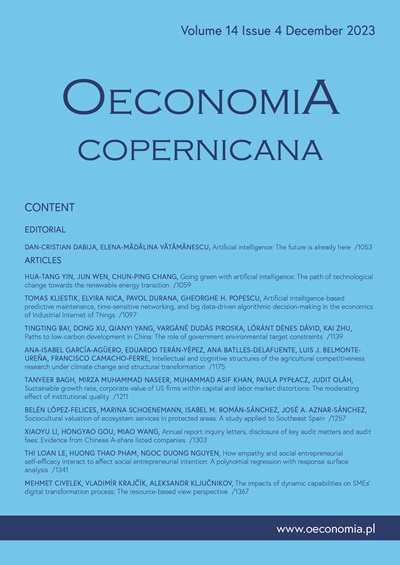A new database on Green GDP; 1970-2019: a framework for assessing the green economy
IF 7.6
1区 经济学
Q1 ECONOMICS
引用次数: 10
Abstract
Research background: Numerous modern indicators are attempting to integrate better economic, political, social, and environmental ambitions to uncover potential synergy, trade-offs, and future views that center around the notion of a so-called green economy. As long as the various indicators are not bounded in one comprehensive measurement, utilizing knowledge of relevant information and statistics that are crucial for monitoring the progress will not give us answers on the progress towards green growth either. Without an adequate measurement framework and robust statistics, the evaluation of the green economy is open to subjective reasoning. Purpose of the article: This paper aims to offer a strong standpoint for green topics by exploring the concept of Green GDP. The paper introduces a new, updated database on Green GDP for the set of 160 countries from 1970?2019. Methods: This database is distinctive due to its balanced coverage of two components of the green economy: quantitative feature (standard methodological algorithm) and qualitative feature (opportunity costs) within a common Green GDP accounting framework. Findings & value added: Standardizing new methodologies and procedures for estimating environmental costs with a statistical foundation provides added value, which we hope will support the creation of reliable accounting and valuation systems for the green economy on a developing "green platform."一个新的绿色GDP数据库;1970-2019年:评估绿色经济的框架
研究背景:许多现代指标正试图将更好的经济、政治、社会和环境雄心结合起来,以揭示围绕所谓绿色经济概念的潜在协同作用、权衡和未来观点。只要各种指标不局限于一个全面的衡量标准,利用对监测进展至关重要的相关信息和统计数据的知识也不会给我们提供绿色增长进展的答案。如果没有足够的衡量框架和稳健的统计数据,对绿色经济的评估就只能凭主观推理。本文旨在通过对绿色GDP概念的探讨,为绿色主题提供一个强有力的观点。本文介绍了一个新的、更新的关于1970年以来160个国家的绿色GDP的数据库?2019.方法:该数据库与众不同,因为它平衡地涵盖了绿色经济的两个组成部分:在共同的绿色GDP核算框架内的定量特征(标准方法算法)和定性特征(机会成本)。调查结果和附加值:在统计基础上标准化估计环境成本的新方法和程序提供了附加值,我们希望这将支持在发展中的“绿色平台”上为绿色经济创建可靠的会计和估价系统
本文章由计算机程序翻译,如有差异,请以英文原文为准。
求助全文
约1分钟内获得全文
求助全文
来源期刊

Oeconomia Copernicana
ECONOMICS-
CiteScore
13.70
自引率
5.90%
发文量
26
审稿时长
24 weeks
期刊介绍:
The Oeconomia Copernicana is an academic quarterly journal aimed at academicians, economic policymakers, and students studying finance, accounting, management, and economics. It publishes academic articles on contemporary issues in economics, finance, banking, accounting, and management from various research perspectives. The journal's mission is to publish advanced theoretical and empirical research that contributes to the development of these disciplines and has practical relevance. The journal encourages the use of various research methods, including falsification of conventional understanding, theory building through inductive or qualitative research, first empirical testing of theories, meta-analysis with theoretical implications, constructive replication, and a combination of qualitative, quantitative, field, laboratory, and meta-analytic approaches. While the journal prioritizes comprehensive manuscripts that include methodological-based theoretical and empirical research with implications for policymaking, it also welcomes submissions focused solely on theory or methodology.
 求助内容:
求助内容: 应助结果提醒方式:
应助结果提醒方式:


